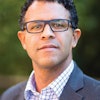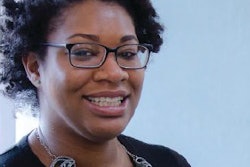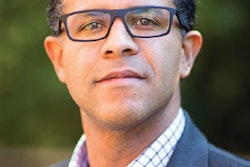During his quest to earn a Ph.D., researcher in the field of neuroscience Antiño R. Allen was called to serve as company commander of an Army Infantry Training Brigade at Fort Benning in Georgia.
That may sound like an interruption to some. But Allen had “absolutely amazing discipline, focus, and dedication in completing his dissertation,” says Dr. G. Troy Smith, an associate professor of biology at Indiana University Bloomington and Allen’s mentor.
“He did not let barriers that would hinder other students keep him from reaching his goal,” Smith says. “During his second tour of duty, he worked long days serving his country, and then would work long hours at night to finish analyzing data and writing his dissertation.
“He is a model for overcoming setbacks and challenges through hard work, and I am very proud of all he has achieved." The hard work paid off.
Today, Allen is an assistant professor of pharmaceutical sciences in the Division of Radiation Health at the University of
Arkansas for Medical Sciences. There, he runs a lab on the fourth floor of the Biomedical Research Building II. He also oversees two graduate students — one who is looking at the long-term cognitive effects of drugs that treat breast cancer and another who is looking at the long-term cognitive effects of drugs used to treat acute lymphocytic leukemia.
Allen says that the two nearly back-to-back military stints better prepared him to run his own laboratory and to train his graduate students to become better at what they do.
“The thing you learn how to do in the Army is run an organization and plan and prepare for whatever issue you’re
going to face,” Allen says, adding that a message he heard constantly in the Army was to improve any organization he
“It’s the same with your lab. You want your organization to be a better, stronger organization,” Allen says. “Those are things I wouldn’t have gotten as a regular graduate student.”
While overseeing graduate students, Allen’s own research is focused on how to prevent the negative side effects of chemotherapy and radiation on normal brain tissue. It’s an area of research that, much like his career, has significant interplay with his military background and experience.
“I had a lot of friends who were getting traumatic brain injuries,” Allen says of his Army comrades, explaining how he wanted to better understand neurogenesis — the process of how neurons are born — and how “this innate thing” could be beneficial.
Allen, who hails from a working-class family in Blue Mountain, Mississippi, credits Jackson State University with
being a supportive environment but also challenging on his road to becoming a soldier and a scholar. He was in the
school’s ROTC program and had superiors who focused specifically on preparing the young officers to become their own men and for the experience of being just one of a few minorities in academe and in military leadership positions. “Jackson State totally prepared me for everything I was going
to face after that in academia and in the military,” Allen says.
Allen makes it a point to seek out minority students in order to inspire and assist their own academic quests.
“My job, as a Black scientist, is to try to get the idea to young kids that this is something you can do,” Allen says. “It’s not one of those things where you have to be at Harvard to do science.
No. It’s you get your Ph.D., you get a job and get a lab.”
The lab, he says, is not only a place to do research — it’s a place to make a difference and help change the face of science.
Title: Assistant Professor of Pharmaceutical Sciences, Division of Radiation Health,
University of Arkansas for Medical Sciences
Education: B.S., biology, Jackson State University; M.S., animal behavior, Indiana University Bloomington; Ph.D., evolution, ecology and behavior, Indiana University Bloomington
Age: 40
Career mentors: Dr. Vernon Archer and Dr. G. Troy Smith, Indiana University
Bloomington; Dr. John R. Fike, University of California, San Francisco
Words of wisdom/advice for new faculty members: Always let the research questions guide you throughout your career.















